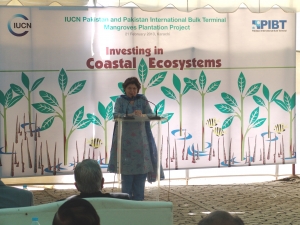IUCN Pakistan- Pakistan International Bulk Terminal Pvt. Ltd Joint Event
Location: Port Qasim Area, Karachi, Pakistan. 21st Feb 2013
Pakistan International Bulk Terminal Limited in collaboration with IUCN Pakistan organised a half-day event at the PIBT site at Port Qasim to highlight the benefits of mangroves for the coastal communities and PIBT’s contribution towards greening and protecting the coasts in the vicinity of Port Qasim.
The event was attended by government officials, foreign dignitaries, representatives of the NGOs, IUCN Pakistan and Pakistan International Bulk Terminal Limited staff members and media persons.
Ms. Aban Marker Kabraji, IUCN Regional Director Asia highlighted IUCN’s engagement with private sector across the region, including under MFF Programme and encouraged private sector in Pakistan to step forward towards achieving a balance between development and environment in their activities.
While sharing the experience of Private Sector and Ecosystem Services in Asia, Ms. Aban Marker Kabraji, IUCN Regional Director Asia said that many people have settled in coastal zones to take advantage of the range of ecosystem services including the opportunities for food production, transportation, recreation and other human activities provided here. Their well-being depends directly or indirectly on the availability of environmental goods and services provided by the natural coastal systems.
She said that PIBT and Port Qasim need to ensure the balance between the development and the environment in their future activities as this can effect the natural life in the area.
She said that thousands of fisher folks depend on the coastal areas. She said that the country is paying huge environmental costs in terms of GDP losses worth Rs.365 billion per year. These are huge costs for a poor country which could be avoided through better environmental governance in the country and more than 50% of the mangroves cover has been vanished in Pakistan in the past few decades. She also talked about exploration of possibilities of the experience sharing between Pakistan and Indian mangroves communities that share the same environment.
The private sector tends to have a relatively short planning horizon, which is not always considering potential effects of e.g. climate change on its activities. Though the public sector has the strongest and most direct incentives to adapt to climate change the private sector typically does not take the initiative for coastal adaptation to climate change, because benefits are small or uncertain.
She congratulated the PIBT for taking this step towards fulfilling their corporate social and environmental responsibility and partnering with IUCN in conservation of coastal mangroves.
While thanking the participants Mr. Haleem Siddiqui, Chairman, Marine Group of Companies said that PIBT had disturbed mangroves from 25 acres of land and are compensating it with the plantation of mangroves over 500 hectares. He was of the view that the country cannot develop without efficient and sizable ports. He appreciated the assistance of IUCN in their effort in plantation of the mangroves.
While delivering the vote of thanks, Mr. Mahmood Akhtar Cheema, Country Representative said that the teamwork of IUCN and PIBT has set an example for others. He said that IUCN has planted around 5 million mangrove plants in Sindh and Balochistan. He further said that mangroves serve as natural barriers against Tsunamis and Cyclones. He was of the view that if the ecosystem are protected the livelihood of many human beings is protected. The model of PIBT and IUCN plantation is a good example and this model can be enhanced and replicated. He also commended the efforts and active role of the Sindh Forest Department in the plantation, restoration and protection of the mangroves.
At the closing of the event mangrove saplings were also planted by the dignitaries.

